Democracy Docket’s 2023 Litigation Report

Since 2020, Democracy Docket has extensively covered and tracked important litigation related to voting rights, elections and redistricting and now has a database of over 660 cases. As in previous years, we are providing a comprehensive year-end report on all the democracy-related cases filed and decided in 2023 that directly impacted voters.
Considering it was not a federal election year, 2023 was quite busy for democracy in the courts. While there were not as many new lawsuits filed this past year relative to 2022, there was a notable influx of consequential outcomes stemming from democracy-related cases that directly impacted voters.
Between Jan. 1 and Dec. 31, 2023, we tracked:
- 73 new democracy-related lawsuits filed across 31 states.
- 146 court orders that impacted voters across 34 states.
- 83 victories for voters across 26 states.
The statistics in this report are based on the lawsuits in our case database as of Dec. 31, 2023. For the purposes of this report, we excluded the 57 active redistricting lawsuits and the small number of criminal cases we are tracking.
Throughout 2023, we tracked 73 new democracy-related lawsuits across 31 states.
Despite not being a federal election year, 2023 nevertheless saw over 70 democracy-related lawsuits spanning dozens of states. By comparison, in 2021 — another off-cycle year — Democracy Docket tracked 57 new democracy-related lawsuits across 18 states.
As expected, the number of new lawsuits filed in 2023 was lower than the 175 new democracy-related lawsuits filed in 2022 both before and after the midterm elections. In anticipation of the upcoming 2024 presidential election, we expect the number of new lawsuits to once again drastically increase this year.
In 2023, we tracked more pro-voting than anti-voting lawsuits and saw a nearly even split amongst lawsuits filed in federal and state courts. Lawsuits that centered around election administration — especially relating to direct democracy and the ballot initiative process — were most prominent among democracy-related litigation filed this past year. We observed how Republicans are doubling down on their anti-voting efforts in court, with GOP litigants bringing 68% of anti-voting lawsuits in 2023. Meanwhile, lawsuits filed by nonpartisan organizations — such as the NAACP or League of Women Voters — accounted for the vast majority of pro-voting litigation.
Below, we break down our comprehensive database of lawsuits that were filed in 2023 and provide analysis of the broader trends that characterized the past year’s litigation landscape.
Unlike in 2022, there were more pro-voting than anti-voting lawsuits filed in 2023.
Democracy Docket categorized the 73 new lawsuits filed in 2023 as either “pro-voting” or “anti-voting.” In total, we tracked 51 pro-voting lawsuits and 22 anti-voting lawsuits filed in 2023.
While this past year’s breakdown is a departure from the trend we saw in 2022 — in which there were more anti-voting lawsuits (93) than pro-voting lawsuits (82) — it is more in line with what we saw in 2021, when there were 49 pro-voting lawsuits and 8 anti-voting lawsuits.
Between 2022 and 2023, we noticed a distinct shift in who was behind new democracy-related litigation, with pro-voting parties bringing the bulk of all new lawsuits in 2023. While anti-voting parties brought 53% of the total lawsuits filed in 2022, they only brought 30% of new lawsuits filed in 2023. Inversely, pro-voting parties brought 47% of the total lawsuits filed in 2022, but nearly 70% of new lawsuits filed in 2023.
This is likely explained by the fact that most off-year election litigation focuses on pro-voting challenges to new voter suppression laws. In both 2021 and 2023, we saw waves of new anti-voting laws enacted by Republican-controlled legislatures. On the other hand, in even-numbered years, litigation tends to focus on how elections are administered and votes are counted — two areas where the anti-voting parties are particularly litigious.
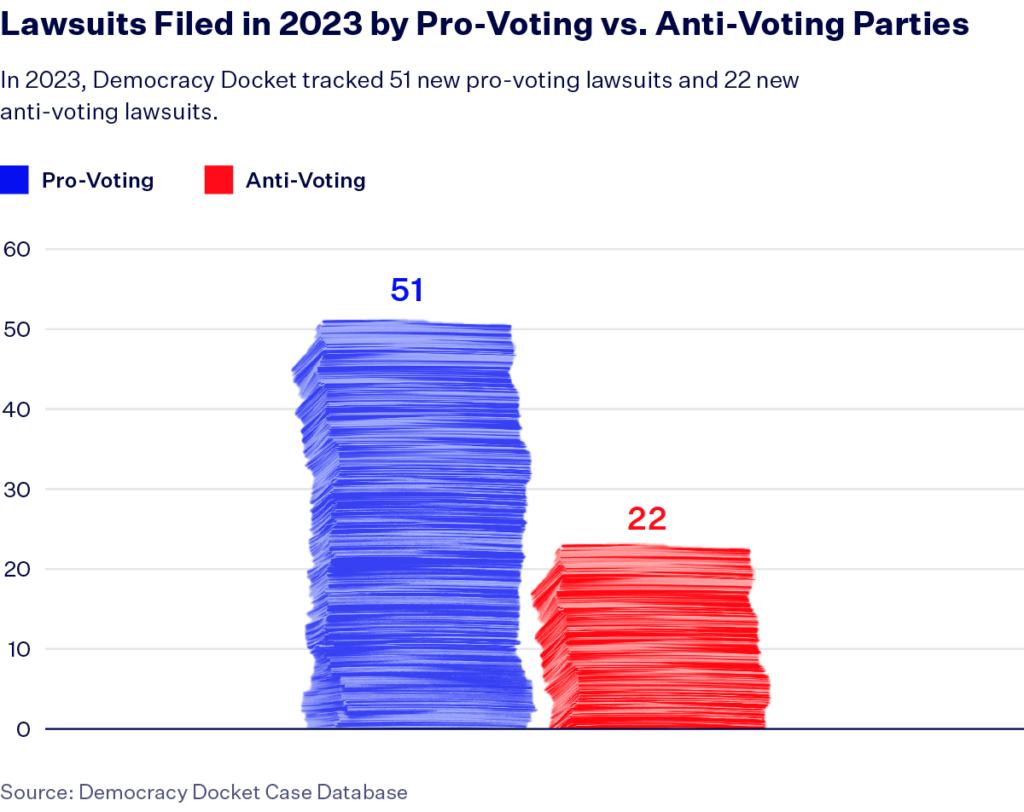
Republicans brought over two-thirds of all anti-voting lawsuits filed in 2023.
Within the categories of pro-voting and anti-voting lawsuits, we examined the number of cases that were proactively brought by Republican Party organizations or candidates compared to those filed by Democratic Party organizations and candidates. On this measure, there was a clear asymmetry.
Of the 22 anti-voting lawsuits filed in 2023, most (15) were brought by Republicans; out of the 51 pro-voting lawsuits filed in 2023, only four were brought by Democrats.
Despite filing fewer new lawsuits in 2023 (15) compared to 2022 (48) — and only two new lawsuits in 2021 — Republican litigants are further entrenching themselves as the predominant force behind anti-voting litigation. Over the past three years, we have observed a marked increase in the proportion of anti-voting lawsuits filed by Republican litigants. Put into percentages, Republicans filed 68% of the new anti-voting lawsuits that we tracked in 2023, an increase from 52% in 2022 and 25% in 2021.
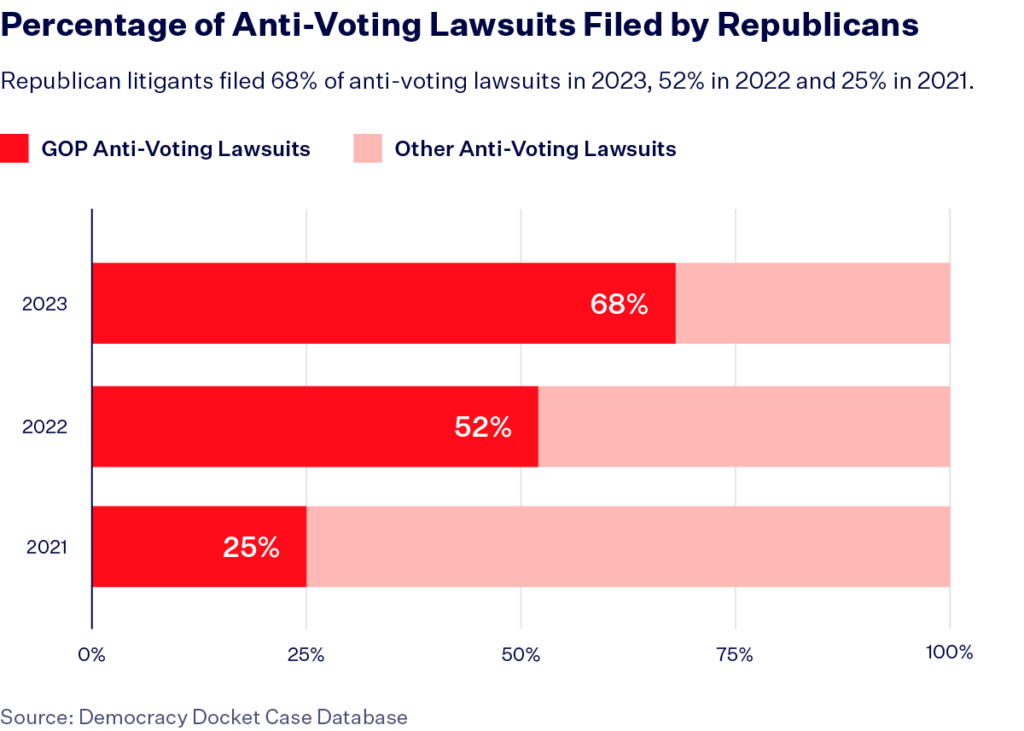
As the GOP is perpetuating its litigious efforts to attain anti-voting and anti-democracy ends ahead of the 2024 election, the Democratic Party continues to utilize the courts more sparingly: Out of the 51 pro-voting lawsuits filed in 2023, 8% were brought by Democrats. In 2022, Democrats brought 7% of new pro-voting lawsuits filed that year while in 2021, they brought 14%.
In 2023, the vast majority — 92% — of the pro-voting lawsuits filed in 2023 were brought by nonpartisan groups, including civic and voting rights organizations and nonprofits. In a similar paradigm to the past few years, the GOP is continuing to serve as the driving force behind anti-voting litigation, whereas nonpartisan organizations are propelling pro-voting litigation.
In addition to filing its own lawsuits, the Republican Party and its affiliates sought to formally oppose nearly 20% of pro-voting lawsuits.
Aside from filing its own proactive anti-voting lawsuits, the GOP and its affiliates asked for permission to intervene on 15 separate occasions in 10 pro-voting lawsuits filed in 2023. An intervention is when an outside group or individual who has a stake in the outcome of a case asks to join a lawsuit. The court then decides whether or not to permit an intervenor to join the case.
By intervening in lawsuits, the GOP aimed to defend various voter suppression laws enacted by GOP-controlled legislatures in states across the county. In Florida, North Carolina, Ohio and Wisconsin, for example, the Republican National Committee and local Republican parties asked to intervene in lawsuits posing challenges to anti-voting laws and practices that restrict mail-in voting, add strict photo ID requirements and make voter registration more difficult.
Between filing its own lawsuits and intervening — or attempting to intervene — in existing lawsuits, the GOP has had a hand in over a third of all the democracy-related lawsuits filed in 2023.
Meanwhile, pro-voting forces sought intervention in nearly 32% of anti-voting lawsuits.
Pro-voting litigants sought to participate in numerous anti-voting lawsuits filed in 2023. In particular, pro-voting groups intervened on eight separate occasions in seven anti-voting lawsuits to oppose efforts aimed at suppressing the right to vote. The vast majority of pro-voting interventions were brought on behalf of nonprofit and civic organizations. Out of the eight pro-voting interventions, two were filed by Democratic Party-affiliated entities and candidates.
Arizona, Florida and Mississippi saw the highest concentration of new lawsuits filed this past year.
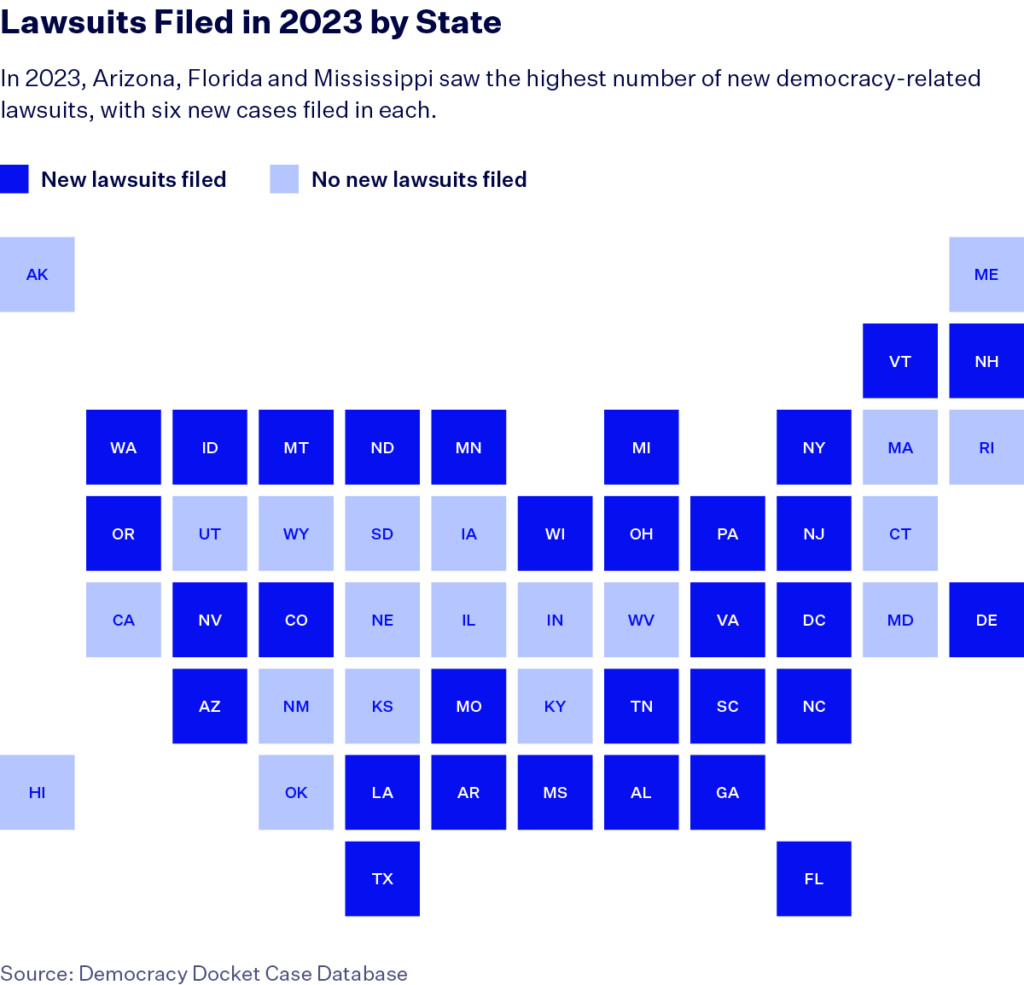
In 2023, we tracked new voting rights and election lawsuits filed across 31 states. Arizona, Florida and Mississippi were the three most litigation-heavy states, with six to seven new lawsuits filed in each. In the remaining 28 states with new litigation, there were about two lawsuits filed on average throughout 2023.
In Arizona — a state that has rapidly developed into a hotbed for election denialism — there were multiple lawsuits brought by right-wing officials and activists seeking to decertify the state’s 2022 election results, despite the fact that duly elected officials were already sworn into office over a year ago. Other lawsuits filed by anti-voting litigants in Arizona aim to upend aspects of the state’s robust mail-in voting infrastructure, including the use of drop boxes and the process of signature matching for verifying mail-in ballots.
In contrast to Arizona, where most lawsuits came from anti-voting litigants, Florida and Mississippi experienced primarily pro-voting litigation in 2023. In Florida, three separate lawsuits mounted challenges to the state’s latest omnibus voter suppression law, Senate Bill 7050. In Mississippi, two lawsuits were filed in response to the Republican-controlled Legislature’s anti-democratic ploy to seize power from the state’s majority-Black capital city of Jackson.
Unlike in 2022, where battleground states — including Arizona, Pennsylvania and Wisconsin — experienced strikingly more election-related litigation in comparison to other states, 2023 was not characterized by disproportionately high rates of litigation in a particular set of states. Nevertheless, as the 2024 election approaches, we can expect the number of lawsuits filed in consequential states to surge.
New lawsuits surrounding election administration and voter registration were most prevalent in 2023.
We broke down our dataset of democracy-related lawsuits by topic, sorting them into six main categories:
- Election administration (26)
- Registration (22)
- Mail-in voting (17)
- In-person voting (10)
- Post-election litigation (6)
- Felony disenfranchisement (6)
(Note, some lawsuits fall within more than one of these six categories.)
Election administration was a focal point of new litigation filed in 2023, with many cases centered around the technicalities of the ballot initiative process and the logistical elements of elections. The past year also saw many lawsuits in the category of voter registration, some of which were filed in response to new Republican-backed laws that frustrate the ability of organizations to engage in voter registration efforts or make voters more vulnerable to having their registrations improperly canceled.
A notable subset of lawsuits within the broader voter registration category mounted challenges to voting laws that govern felony disenfranchisement and voting rights restoration. These challenged laws make it extremely difficult — or virtually impossible — for individuals with felony convictions to register to vote and regain their voting rights following sentence completion.
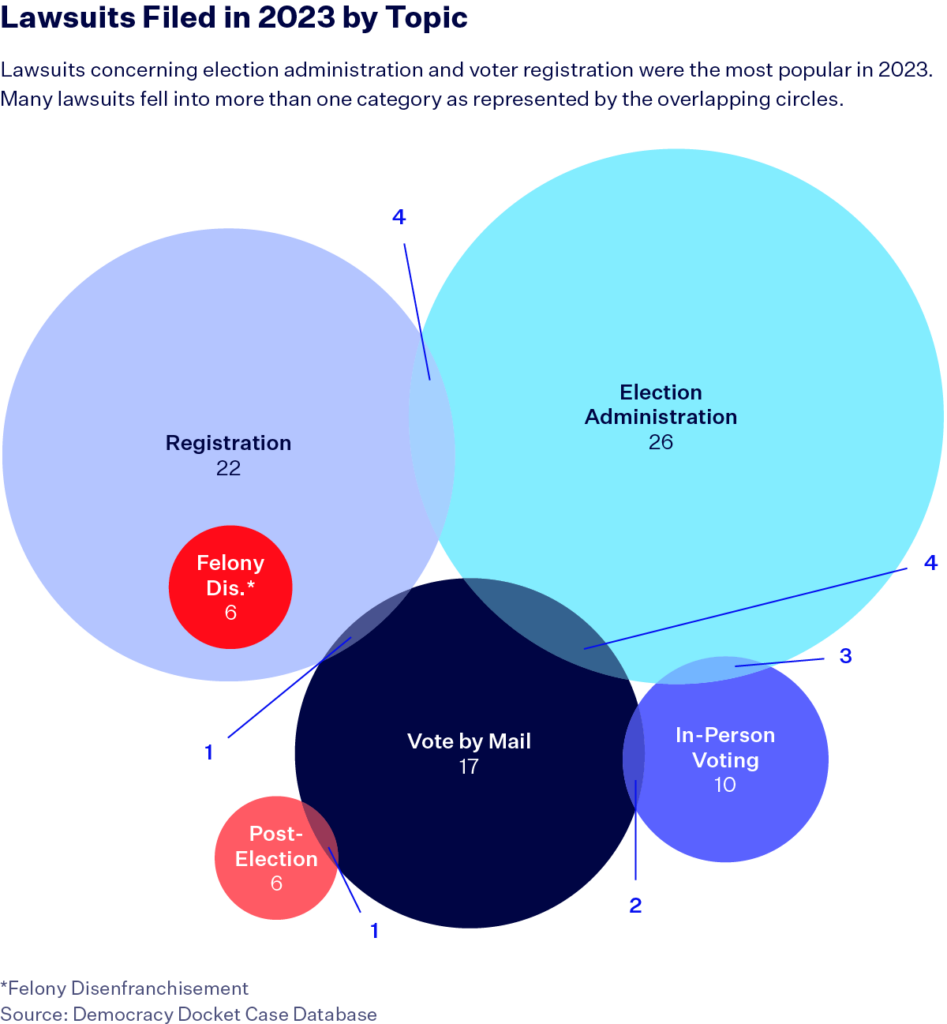
Election administration
In accordance with 2022’s trend, lawsuits pertaining to the minutiae of election administration — namely the logistical aspects of running an election — constituted the most popular category of lawsuits filed in 2023. These lawsuits involved polling place equipment, ballot counting or processing procedures and deadlines, ballot initiatives and election personnel.
Registration and felony disenfranchisement
This past year, we monitored 22 new voter registration lawsuits, most of which were brought by pro-voting organizations seeking to make registration easier. We also saw six new lawsuits challenging registration laws pertaining to felony disenfranchisement and voting rights restoration.
Vote by mail
There were 17 lawsuits filed in 2023 concerning mail-in voting — an increasingly popular and reliable voting method that many states have embraced since the 2020 election. Among lawsuits over mail-in voting, 59% were brought by pro-voting litigants.
In-person voting
Ten of the lawsuits filed in 2023 fell into the category of in-person voting, most of which challenge voter suppression laws that were enacted with the intent of making it more difficult in person on or before Election Day.
Post-election litigation
As opposed to 2022, in which we tracked 40 post-election lawsuits following the midterm elections, 2023 saw relatively few (six) post-election lawsuits. Strikingly, none of the post-election lawsuits filed this past year concerned elections held in 2023.
A wave of lawsuits challenged Republican legislatures’ attempts to strip power from Democratic locales and officials.
Throughout 2023, Republican-controlled legislatures in Mississippi, North Carolina, Tennessee and Texas engaged in power grabs aimed at disempowering local Democratic strongholds and elected officials in red states. A series of lawsuits were filed in response to these anti-democratic usurpations.
In Mississippi, the GOP-controlled Legislature enacted an anti-democratic law — House Bill 1020 — targeting the state’s majority-Black capital city of Jackson. A now-struck down provision of the law would have allowed the white, conservative chief justice of the state Supreme Court to appoint unelected judges to an existing court with jurisdiction over Jackson. The law also creates a new, unelected court within the state’s Capitol Complex Improvement District, a special district in Jackson centered around the state capitol building with its own police force.
In response to the law, two lawsuits were filed — one in state court and one in federal court. In the state-level lawsuit, the plaintiffs prevailed in striking down H.B. 1020’s court-packing provision. Litigation in the federal lawsuit regarding other provisions of H.B. 1020 remains ongoing.
In Tennessee, the Republican-controlled Legislature passed a law requiring the Metropolitan Government of Nashville and Davidson County — which serves as Nashville’s consolidated city and county government — to cut its Metro Council in half. Two lawsuits were filed challenging the new legislation that targets Tennessee’s most populous city. In April 2023, a state court temporarily blocked the provision requiring the Metro Council to reduce its size as litigation proceeds.
In 2023, the Texas Legislature seized power away from Harris County — the state’s most populous, largely Democratic county. In particular, the GOP-dominated Legislature passed a law abolishing the appointed election administrator position within Harris County and transferring responsibilities back to the county clerk and county tax assessor, both of whom are elected officials.
Although the county initially prevailed in temporarily blocking the law via a lawsuit, the Texas Supreme Court paused this ruling, thereby greenlighting the takeover of the county’s election administration. The county ultimately withdrew its legal challenge against the state, leaving the statute in place.
In North Carolina, the state’s veto-proof GOP legislative supermajorities enacted a power-grab law that removes the Democratic governor’s authority to appoint members to the state board of elections, and instead grants it to the North Carolina Legislature.
Under the new law known as Senate Bill 749, state boards would have an even number of Democrats and Republicans, departing from the current system that allows the party that holds the governor’s office (currently the Democratic Party) to appoint a majority of state board members. The law also alters the composition of the state’s 100 county election boards to be four-member bipartisan boards appointed by lawmakers, making stalemates in decision-making more likely.
At the end of November, a state court granted North Carolina Gov. Roy Cooper (D)’s request to temporarily block provisions of S.B. 749 as his legal challenge continues.
State courts and federal courts saw nearly the same number of new lawsuits.
Out of the 73 democracy-related lawsuits from 2023, 37 were filed in state court and 36 were filed in federal court. This past year’s nearly even distribution of lawsuits across state and federal courts is a notable departure from 2022’s litigation landscape, in which the vast majority of lawsuits were filed in state court.
Nevertheless, the significant number of lawsuits filed in 2023 at the state level highlights the perennial salience of state courts and state constitutions in shaping voting rights and democracy. The U.S. Supreme Court affirmed as much in its June 2023 Moore v. Harper decision, where a majority of the justices rejected a right-wing legal theory that had the potential to severely undermine the ability of state courts to review state laws regulating federal elections.
In 2023, pro-voting lawsuits made up a larger share of overall cases filed in both state and federal courts. This stands in contrast to 2022’s trend, in which anti-voting lawsuits constituted the majority of cases filed in state courts and pro-voting lawsuits predominated among cases filed in federal court.
As in 2022, anti-voting parties more often filed lawsuits in state courts than federal courts this past year: Anti-voting litigants brought lawsuits at the state-level 64% of the time and at the federal level 36% of the time.
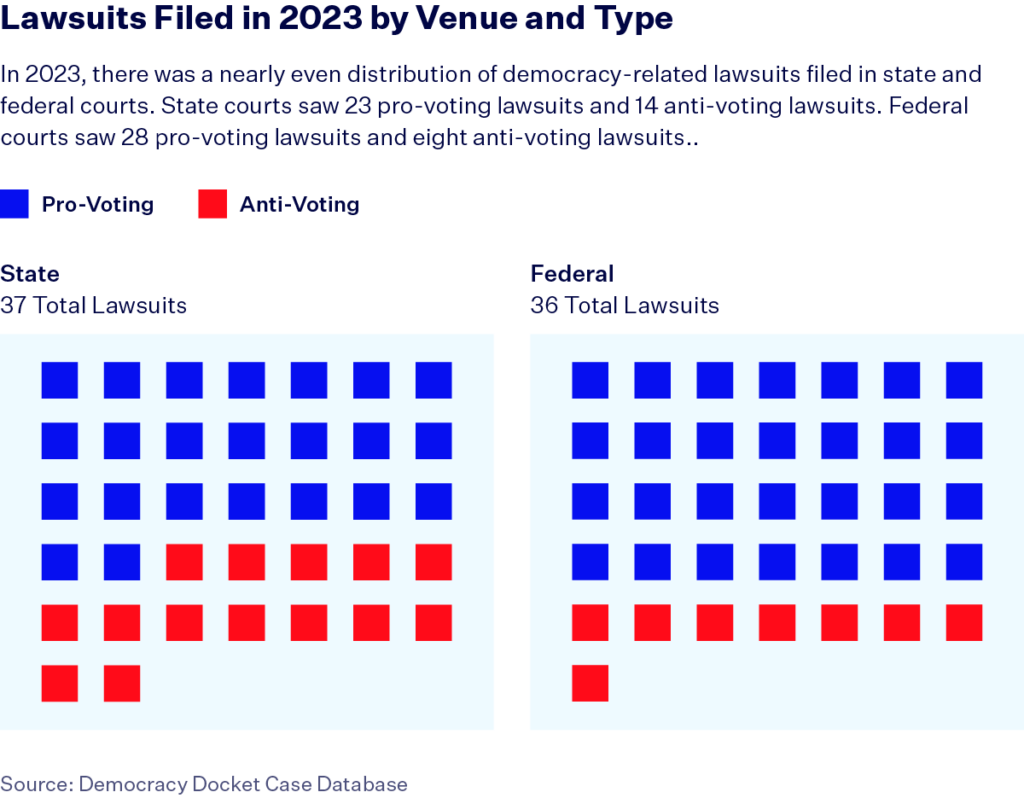
In 2023, many new lawsuits undoubtedly shaped voting rights.
As an off-cycle year, 2023 — much like 2021 — was a relatively light year for new democracy-related litigation. Nevertheless, new lawsuits populated court dockets across 31 states. In a noteworthy shift from 2022 — in which more lawsuits fell into the anti-voting bucket — the majority of lawsuits filed in the past year came from pro-voting litigants.
With the 2024 election ahead, we expect to see Republicans file a deluge of new lawsuits aimed at making voting more difficult in consequential swing states. Concurrently, we anticipate that pro-voting groups will continue their efforts to combat voter suppression and uphold the promise of free and fair elections in 2024.
In 2023, voters won twice as often as they lost, with 83 victories and 40 losses.
2023 proved to be an impactful year for voting rights litigation. From upholding a critical mail-in voting law in Pennsylvania to striking down key provisions of a law that took power away from Mississippi’s majority-Black capital city, the courts protected voters on many occasions. In total, we tracked 146 consequential court orders — both interim and final — handed down in 2023 across 34 states. Well over a majority of these decisions — nearly 57% — were victories for voters. Those opposing voting rights won only 27% of the time.
Of the 146 orders issued in 2023, 83 were victories for voters, 40 were losses and the remaining 23 had a neutral impact. In 2023, democracy largely won in the courtroom.
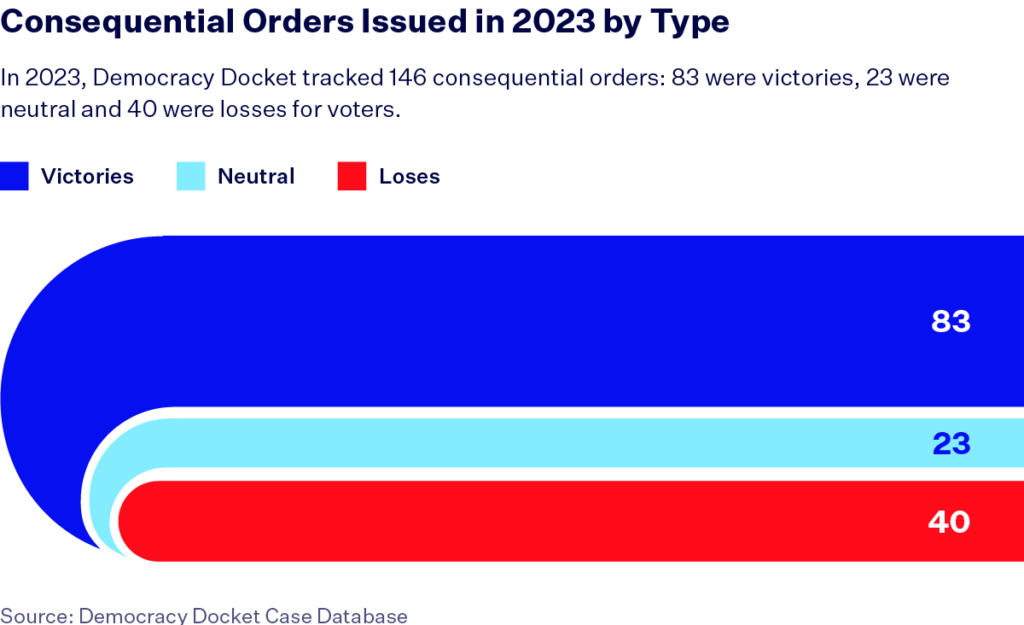
In 2023, courts handed down mostly final orders, a majority of which protected voters.
Of the 146 consequential orders issued in 2023, 20 were interim orders and 126 were final orders. This is a major contrast from 2022 where the majority of orders were interim.
In 2022, litigants frequently requested temporary relief in new litigation filed right before the 2022 midterm elections, leading to a deluge of interim orders. Conversely, in 2023, cases that were newly filed had less urgency for an immediate resolution and therefore saw far fewer interim orders. Instead, we saw numerous final orders issued in cases with long trajectories that came to ultimate resolution this past year.
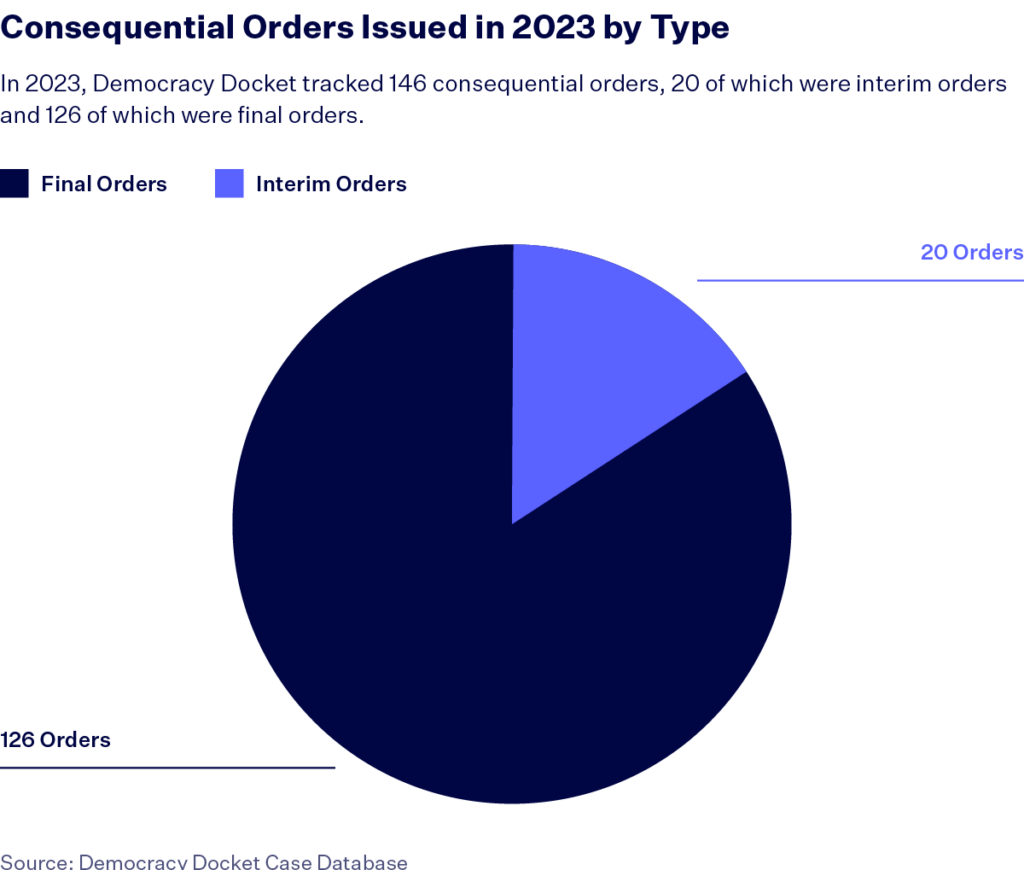
We categorized each consequential order as either a victory, loss or neutral outcome. Below are a few examples of the cases decided in 2023 and how they are categorized:
- Victory: In Bonner v. Chapman, a Pennsylvania trial court rejected state Republicans’ attempt to invalidate Act 77, an expansive mail-in voting law that created no-excuse mail-in voting in the state. The Republican plaintiffs subsequently appealed the decision allowing Act 77 to remain in place to the Pennsylvania Supreme Court, but ultimately withdrew their appeal in August 2023. Consequently, Act 77’s mail-in voting protections remain in effect.
- Neutral: In Public Interest Legal Foundation v. Meyer, a right-wing legal group (PILF) alleged that Alaska must release documents related to the maintenance of the state’s voter lists. On Sept. 20, 2023, the parties entered a settlement agreement, thereby ending litigation and minimally changing the status quo: While PILF gained access to some of the data it requested, it did not get access to voter identification numbers or voters’ birthdates.
- Loss: In Falls v. Goins, the Tennessee Supreme Court upheld the state’s out-of-state felony disenfranchisement policy, which prevents individuals from registering to vote if they have felony convictions in another state. The court held that even if the individual with a felony conviction had their rights restored by the state in which they originally committed a felony — but only regained their rights after they moved to Tennessee — they cannot be re-enfranchised in Tennessee unless they “provide evidence” demonstrating that they do not owe court fees, restitution or child support.
Voters benefited from 14 interim victories in 2023.
In 2022, we saw a plethora of interim orders issued ahead of the midterm elections. In 2023, however, without a major general election deadline looming, courts issued far fewer interim orders. There was a total of 20 interim orders issued in 2023, 14 of which were victories for voters and six of which were losses. While courts issued fewer interim orders than in previous years, the impact was still notable: 70% of 2023 interim orders were victories for voters.
Here is an example of how interim orders were categorized in a critical case challenging Georgia’s omnibus voter suppression law.
- Victory: In Georgia, a federal judge issued an order temporarily blocking a provision of the state’s 2021 omnibus voter suppression law — Senate Bill 202 — that required election officials to reject a voter’s absentee ballot if the birth date written on an outer ballot envelope did not match the voter’s registration record. The judge also temporarily blocked part of S.B. 202’s line-warming provision that imposed criminal penalties on individuals who handed out food and water to voters even if they were more than 150 feet from a polling place.
- Loss: Also in the consolidated lawsuit over Georgia’s S.B. 202, the federal judge presiding over the case issued an order declining to temporarily block provisions that limit the availability of drop boxes and restrict who can assist individuals in returning their completed absentee ballots. In a separate ruling issued in October, the judge also declined to temporarily block five other challenged provisions of S.B. 202.
Interim victories were instrumental in stopping Republicans’ attempts to take power away from Democratic cities and officials.
- In Mississippi, an interim order blocked a provision of an anti-democratic law targeting the state’s majority-Black city of Jackson as litigation continues. The Mississippi Supreme Court later permanently blocked the provision in a state-level lawsuit.
- In Tennessee, an interim order blocked a new law requiring Nashville’s Metro Council to reduce its size by half.
- In Texas, an interim order blocked a new law that took power over election administration away from Harris County, the state’s most populous, largely Democratic county. Unfortunately, this decision was later voided by the state Supreme Court and litigation is now over.
- In North Carolina, an interim order blocked a new law that removes the governor’s power to appoint members to the state board of elections and instead hands it to the Republican-controlled Legislature.
Voters benefited from 69 final victories in 2023.
There was an avalanche of final orders this past year and with that came a high volume of final victories for voters. Of the final orders issued in 2023, 69 were victories for voters, 23 were neutral and 34 were losses.
Of the cases we are tracking that were filed either before or during 2023, 91 of them are now completely resolved and 45 ended in victories for voters. (Other cases in which final orders were issued in 2023 remain active due to appeals or ongoing litigation regarding other claims that are not yet resolved.)
Pro-voting litigants contributed to a plethora of voter victories.
In total, 83 victories positively impacted voters throughout 2023. Thirty-four victories stemmed from successful lawsuits filed by pro-voting parties, two of which were brought by Democratic litigants.
Contrary to the success that pro-voting litigants had in court, anti-voting litigants very seldom prevailed. Forty-nine victories came from failed lawsuits brought by anti-voting parties seeking to limit voting access, 28 of which were filed by Republican litigants.
Overall, the combined losses by anti-voting litigants — specifically Republicans — and the successes of pro-voting litigants contributed to a wealth of voter victories in 2023.
State courts handed down two-thirds of all victories in 2023.
In 2023, there were 90 orders issued in state court and 56 orders issued in federal court. Of the 90 state court orders, 55 were victories. Of the 56 federal court orders, 28 were victories. This is great news — state courts protected voters in over 60% of the lawsuits we tracked. Federal courts were also critical in protecting voters issuing pro-voting orders 50% of the time.
In 2023, there were 26 states with victories for voters. The states with the most voter victories either interim or final were:
- Arizona (19)
- Pennsylvania (11)
- Georgia (6)
- Mississippi (5)
- Texas (5)
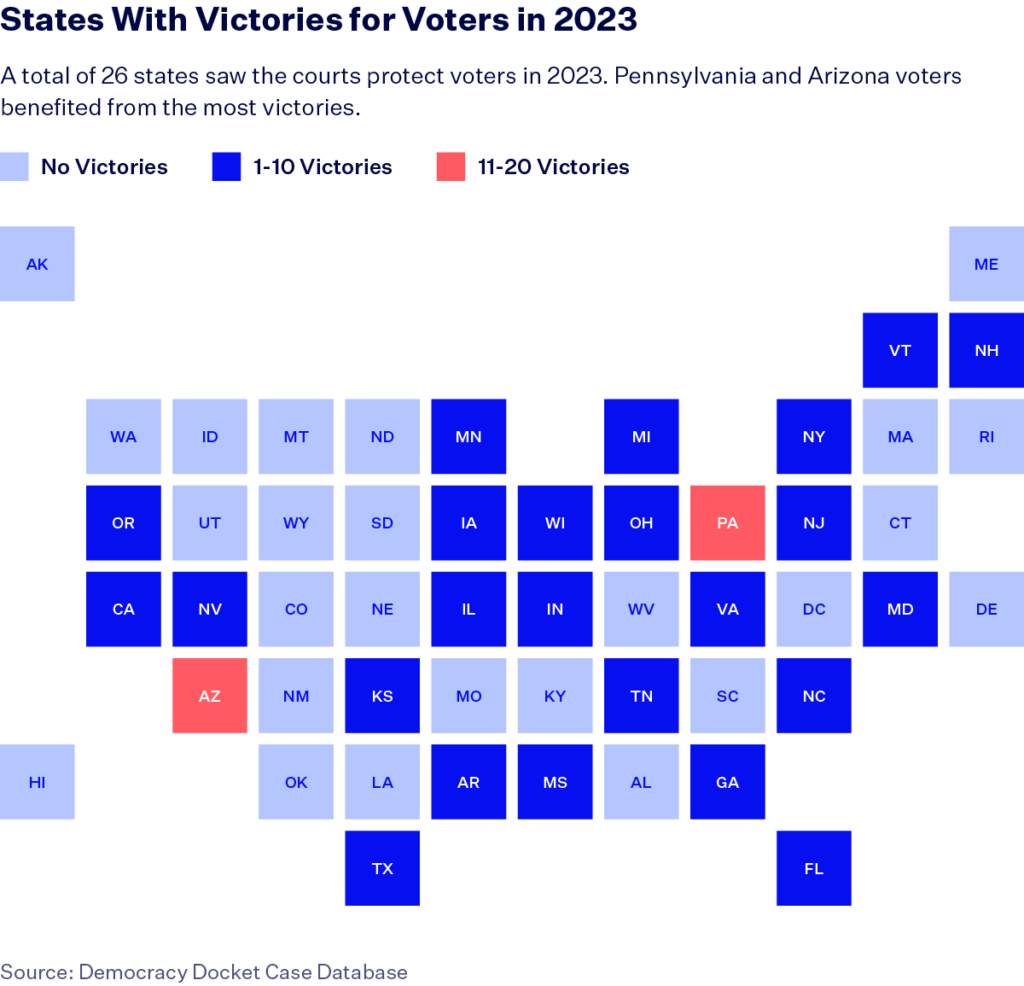
The top two states, Arizona and Pennsylvania, saw a slew of victories from lawsuits that began in the runup to and the aftermath of the 2022 midterm elections that were finally resolved in 2023. Meanwhile, in Georgia, Mississippi and Texas, victories protected voters from various anti-voting laws.
Lawsuits successfully blocked provisions of major voter suppression laws across three states.
Five victories were crucial in blocking key provisions of voter suppression laws in three states. One victory blocked provisions of Texas’ omnibus voter suppression law, Senate Bill 1. Two victories stemmed from orders blocking provisions of Florida’s voter suppression law S.B. 7050. Finally, two victories blocked enforcement of key provisions of Georgia’s voter suppression law, S.B. 202.
A significant number of victories came from election contests challenging 2022 midterm election results.
Sixteen victories stemmed from lawsuits and election contests filed in relation to the 2022 midterm elections. At the onset of 2024, six lawsuits challenging the results of the 2022 midterm elections remain ongoing. Although election deniers like Kari Lake are still fighting in court to this day, Lake’s losses in her election contest alone amounted to three victories for Arizona voters in 2023.
Anti-voting litigants were quick to appeal voting rights victories.
Anti-voting parties appealed nine interim victories out of the 14 total that came down in 2023 and 18 final victories out of the 69 total issued this past year. This means that when pro-voting decisions were issued by courts, anti-voting litigants appealed nearly one-third of the time. On the contrary, pro-voting parties appealed two interim losses and seven final losses. Final orders issued in 2023 are currently on appeal in 23 active cases.
Heading into 2024, there is no doubt that democracy is on the docket.
As we always say, there are no off years for democracy. This past year was no different. 2023 turned out to be a busy year for democracy-related litigation, especially for an off-cycle year without a high turnout general election.
From blocking the unfair rejection of mail-in ballots in Texas and Pennsylvania to halting discriminatory power grabs in Mississippi and Tennessee, democracy overwhelmingly won on court dockets in 2023.
With the 2024 presidential election just around the corner, we are sure to see an uptick in litigation that will affect how voters can cast ballots and how ballots will be counted. Democracy Docket will continue to track and report on these important lawsuits that will impact voters through the next election cycle and beyond.
Methodology
The statistics in this report are based on the lawsuits in our case database as of Dec. 31, 2023. We excluded all of the redistricting and criminal cases we are tracking. Accordingly, our analysis focuses just on civil cases pertaining to voting laws and elections, which we refer to as “democracy-related” litigation throughout this report.
Acknowledgments: This report was written by Democracy Docket Senior Case Coordinators Madeleine Greenberg and Rachel Selzer, with editing and other assistance from Democracy Docket Case Manager Ashley Cleaves. Democracy Docket Graphic Designer Madison Coviello created the graphics for this report.